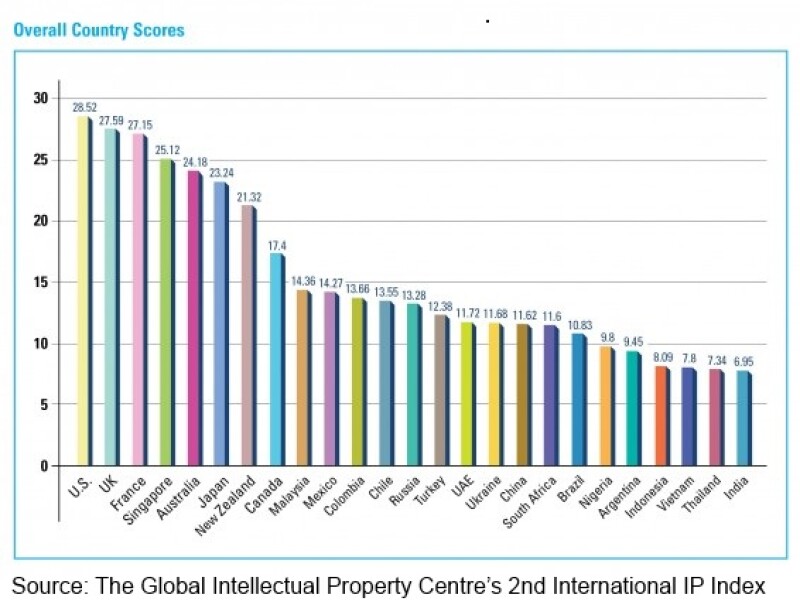
The index maps the IP environment of 25 countries by 30 factors the GIPC believes are indicative of fostering growth and development. The number of countries was up on the 11 that were included in the first index, released last year, but still puzzlingly omits Europe’s largest economy Germany.
The survey has the US on top for the second year in a row. Its score of 29 put it ahead of the UK, with 28, and France, with 27. These three countries are followed by four Asia-Pacific countries: Singapore, Australia, Japan and New Zealand.
Some would disagree with the ranking of the US at number one. Certainly many believe its patent system needs to change. The system is odds on to undergo further legislative upheaval only a few years after 2011’s America Invents Act, which took many years to pass and was meant to put the issue to bed for a long time. In addition, continuing confusion remains over key questions such as whether or not software is patentable or not. On top of all that, the world’s supposed leading IP environment has not even been able to find a leader for its patent office despite having more than a year to have done so.
An example of the disillusion and concerns about the US patent system came from former AIPLA president Jeffrey Lewis. In December he told me that the US system was in such a state that it was now “at a crossroads”.
“For the past 100-plus year we have been saying the US is the better patent system for innovation,” the Patterson Belknap Webb & Tyler partner told me. “That is no longer true. The courts have so muddied the water as to make it absolutely inconceivable that anyone can have any certainty. The only thing you can be certain about is that our system is less protective than other systems at this point.”
Elsewhere, the report reveals encouraging news for China, Russia and Malaysia.
For patents, China was assigned the highest score of all middle-income countries and outperformed some high-income countries such as Chile and UAE. But the country still faces challenges in trade mark and trade secrets, which pushed its overall score below those two countries, the GIPC noted.
Russia’s new notice-and-takedown provision regarding the responsibilities of “information intermediaries” suggests progress in protecting copyright. Malaysia has also introduced important changes to its copyright laws.
The GIPC also noted the 12 countries involved in the negotiations of the Trans Pacific Partnership (TPP) Agreement have a chance to improve their IP environments. Ten of those countries are ranked in the GIPC report.
In a contrast, a number of countries’ IP environments have worsened in the past year, including India, South Africa, Ukraine and Australia.
India remains the weakest IP environment of all countries in the index. This is a result of the continued use of compulsory licences, patent revocations, and weak legislative and enforcement mechanisms. These have raised concerns about India’s commitment to promote innovation and protect creators.
South Africa received a poor score in the patents category because of the lack of patent term extension for pharmaceutical products and regulatory data protection for clinical data.
Ukraine’s score is boosted by its high score in the treaties category. But its IP environment continues to be weak across all IP categories.
Australia’s plain packaging requirements limit the ability of trade mark owners to exploit their rights and sends what the GIPC terms a “chilling message to brand owners interested in selling in the Australian market”. Five countries last year brought action against Australian in the WTO on the basis that the new law violates its WTO commitments.
Canada was singled out for both praise and criticism. It recently finished negotiations with the EU on the Comprehensive Economic and Trade Agreement, which would improve the country’s IP environment should its provisions be successfully implemented. But it continues to lag behind other developed nations on protecting and enforcing IP. Particular concerns exist about the lack of a takedown mechanism or equivalent obligation on the copyright side, and the onerous patent utility requirements related to pharmaceutical patents.









